Late (and very early) Orson Welles season
The Immortal Story
Dir: Orson Welles, 1968, France, 58 mins, Language: English, Cert: 15
-
Sun 20 October 2024 // 17:00
Tickets: £5 (full)
In October we’re screening three late Orson Welles films - F for Fake, The Immortal Story and Chimes at Midnight - and in November, the very first Welles film, the silent comedy Too Much Johnson.
“Surpassingly, heartbreakingly beautiful … Welles achieves a resonant, diaphanous delicacy that’s rare even for him.”
—Chuck Bowen, Slant
Orson Welles’ last fiction film is a fable about sex, stories and power, starring Welles himself as an embittered merchant who becomes obsessed with bringing an old sailing legend to life, with Jeanne Moreau and Norman Eshley as the chess pieces in his kinky game.
Although set in 19th century Macao, Welles filmed much of The Immortal Story in the grounds of his Spanish villa and the surrounding medieval villages, helping to give it the feel of a story out-of-time. Welles’ was also forced to shoot in colour by his French financial backers, and while the man himself was sceptical of abandoning black-and-white (“faces in color tend to look like meat — veal, beef, baloney”), the hyper-saturated palette only increases the film's fever-dream quality.
Matching the surreal style is a bonkers story - a dying plutocrat recruits a young man to recreate the legendary tale of a rich man cuckolded by a seaman - which is impossible not to see as a Welles’ own perverse commentary on the movie-making process.
“Both the story itself and the tale-within-the-tale are recounted with the sort of elemental purity we associate with myths and fairy tales, and because all four of the characters are solipsistic loners in different ways and mirrors figure often in the settings, repetitions, echoes, and other rhyme effects involving both words and images recur throughout. It is quintessentially a tale about the lures and perils of storytelling itself — that is, the lures and perils of its processes — and about the power plays among its various participants (tellers, listeners, facilitators, and characters).”
—Jonathan Rosenbaum, criterion.com
“A metaphorical tale of impotence, memory, power and mortality made on a tiny budget in Europe it both chases its own tail and is a deeply felt film of melancholy mood and sensibility. The film has the quality of a miniature; short in length and minimalist in design. It also appears depopulated, as if the product of a fragmented dream or imagination. Based on a short story by Isak Dinesen (Karen Blixen), The Immortal Story is a film of both embellishment and small detail, an intricate tale which relies upon the interlacing of experiences and memories …beautifully rendered and intricately told, it is a world-weary work preoccupied with the exhaustion of narrative, storytelling and even the world itself.”
—Adrian Banks, Senses of Cinema
